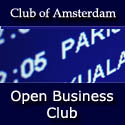|
|
|
| .The
Future of Consciousness |
|
|
|
by Arjan Kindermans, Managing
Director,  EnlightenNext
Amsterdam
EnlightenNext
Amsterdam |
How does consciousness
develop? This is a fascinating question. Consciousness. Pure subjectivity.
Awareness. We all know it exists. That is why you are able to read
this piece, for example. Yet scientists aren't able to find it.
You can't locate it. Consciousness is not a 'thing'. It is what
everything appears in. It is not the seen but
the seeing itself. Now, talking about the evolution of
consciousness gets even trickier. Here we are talking about the
development of that which everything appears within and not
about the development of all the things that we can
see.
Since we made it
from cells via bacteria, fish, mammals, primates, primitive peoples,
medieval citizens to modern humans, something is definitely developing,
and it isn't just our tools. We are becoming increasingly conscious;
how we see ourselves, how we see the world and how we interpret
what we see, is all developing. Recently that development has
sped up tremendously. We went into space and saw the earth from
above for the first time. We started connecting with people from
all over the world through the Internet. We are now getting news
from anywhere, literally within minutes. We have been evolving
both technologically and psychologically; we left behind old values
and dogmas. Many of us freed ourselves from the ties of tradition
and religion and decided for ourselves what we believe in. We
are more conscious now, and we started focusing that greater awareness
on ourselves. We have become our own highest value, and that is
what we seem to have gotten stuck in. As positive as it is - the
individuality that is such a high value in our culture has made
possible many things that were impossible before - yet the attachment
to our individuality, to the image we have of ourselves, our cultural
narcissism, makes moving to the next stage in our evolution very
difficult.
Many people have
stated that the crisis we are in now is a spiritual one that it
is our consciousness that needs to change. As one of Albert Einstein's
most quoted aphorisms states: you can't solve problems with the
same level of thinking that created them. So we have to leap.
We have to shift to a higher level. I am passionately interested
in finding out how to do that and, more importantly, in
actually doing that. In  Andrew
Cohen's philosophy, called
Andrew
Cohen's philosophy, called  Evolutionary
Enlightenment, my interests in spirituality and evolution
came together and I found it opened up the previously unthinkable
possibility of consciously creating the future; to be an
agent for and expression of the process of evolution that, consciously
or not so consciously, we are all part of.
Evolutionary
Enlightenment, my interests in spirituality and evolution
came together and I found it opened up the previously unthinkable
possibility of consciously creating the future; to be an
agent for and expression of the process of evolution that, consciously
or not so consciously, we are all part of.
|
|
|

|
| .News
about the future of Consciousness |
| |
|
|
 |
|
 The
Online Experiments Portal
The
Online Experiments Portal
Rupert Sheldrake invites
you to participate in his ongoing research. No previous experience
is necessary, and the online tests can be done immediately. Most
of these experiments are suitable for use in schools and colleges,
and some make an excellent basis for student projects.
Rupert Sheldrake, iconoclast, biologist, and author of The Sense
of Being Stared At, brings his inquisitive, scientific mind
to the exploration of intuition, precognition, and telepathy.
|
| |
|
CONSCIOUSNESS
|
 |
|
New
Brain Cells
Fred Gage is a neuroscientist at the Salk
Institute for Biological Studies in La Jolla, California. Gage’s
lab showed that, contrary to accepted dogma, human beings are capable
of growing new nerve cells throughout life. Small populations of immature
nerve cells are found in the adult mammalian brain, a process called
Neurogenesis. Gage is working to understand how these cells can be
induced to become mature functioning nerve cells in the adult brain
and spinal cord. They showed that environmental enrichment and physical
exercise can enhance the growth of new brain cells and they are studying
the underlying cellular and molecular mechanisms, that may be harnessed
to repair the aged and damaged brain and spinal cord.
|
| |
|
|

|
| .Club
of Amsterdam blog |

|
 |
 Club
of Amsterdam blog
Club
of Amsterdam blog
http://clubofamsterdam.blogspot.com
December
18:  selflead
selflead
December 14:  On
the Art of Value-Webbing
On
the Art of Value-Webbing
October 26:  Synthesis
of elBulli cuisine
Synthesis
of elBulli cuisine
October 14:  The
new Corinthians: How the Web is socialising journalism
The
new Corinthians: How the Web is socialising journalism
|

|
|
|
| .News
about the Future |
| |
|
|
 |
|
 Learning
Retinal Implant System
Learning
Retinal Implant System
The Learning Retinal Implant System is an adaptive visual prosthesis
– an "artificial retina" – that bridges and
replaces the defective information processing function of the real
retina in patients with retinal degeneration. It thus enables blind
people to regain modest visual perception and a sense of orientation
even in unfamiliar surroundings. The Retinal Implant is expected
to improve the quality of life of this group of patients significantly
and permanently.
|
| |
|
|
 |
|
 KishKish
Lie Detector
KishKish
Lie Detector
KishKish Lie Detector
offers you a tool to detect the stress level of the person you talking
with over Skype. With the use of KishKish Lie Detector you can monitor
in real-time the stress level of the person you talked with. This
allows you to gage the level of stress and modify your questions
in real time. You could also use our KishKish SAM VSA that allows
you to record the call and analyze the stress level off-line.
Researchers found that
frequencies in the human voice are sensitive to honesty. When a
person is being honest the average sound in that range is generally
in the lower frequencies, but is usually higher in dishonest situations.
Some people have high average stress levels, and some have low,
and averages changes from day to day along with mood. What all people
have in common is that their stress levels are constantly changing
within their current range, changes which indicate the "perceived
jeopardy" or "danger" of statements being made. A
lie is often dangerous, humiliating, or injurious to get caught
at, so lies tend to stand out on stress measurements.
|

|
|
|
| .Next
Season Event |

|
|
 the
future of Consciousness
the
future of Consciousness
Thursday,
January 25, 2007
Registration: 18:30-19:00, Conference:
19:00-21:15
Where: EnlightenNext, Oudeschans 46a, 1011 LC Amsterdam
 Tickets
for € 30, € 20 [discount] or € 10 [students]
Tickets
for € 30, € 20 [discount] or € 10 [students]
Mauk
Pieper,
Trainer,
Coach, Teacher
Cultural development
and the development of man as a new more conscious being have to go
hand in hand.
Arjan
Kindermans,
EnlightenNext
Amsterdam
Transcending
and including individualism, how do you do that?
George
Pór,
Founder,
CommunityIntelligence Ltd.
What Color is Your Collective Intelligence?
Moderated
by Lisette
Thooft,
Author,
free lance journalist




Supporter

|
| |

|
|
|
| .Recommended
Book |
| |
|
|

|
|
 Earthdance
Earthdance
by Elisabet Sahtouris, James E. Lovelock
An evolution biologist's story of planet Earth and its people from
origins to a sustainable future. Past patterns of biological evolution
offers clues to the natural process of globalization.
"This book is a work of philosophy in the original sense of a
search for wisdom, for practical guidance in human affairs through
understanding the natural order of the cosmos to which we belong.
It bears little resemblance to what we have come to call philosophy
since that effort was separated from natural science and became more
an intellectual exercise in understanding than a practical guide for
living.
To find meaning and guidance in nature, I integrated my personal experience
of it with those scientific accounts that seemed to best fit it. From
this synthesis, meaning and lessons for humanity emerged freely. I
wrote the original version in the peaceful, natural setting of a tiny
old village on a small pine-forested Greek island, where I could consider
the research and debates of scientists, historians, and philosophers,
then test them against the natural world I was trying to understand."
|

|
|
|
| .The
evolutionary significance of spiritual development |
|
 The
evolutionary significance of spiritual development
The
evolutionary significance of spiritual development
by John Stewart
Are we organisms that are forever constrained by their biological
and cultural past? Or can we become self-evolving beings —
organisms that are able to adapt in whatever directions are necessary
for future evolutionary success, relatively unfettered by our evolutionary
past or by our previous life experiences?
This article
argues that humans can develop such a capacity to transcend human
nature, and that the next great evolutionary challenge for humanity
is to do so. The paper suggests that the practices and tools that
will enable humanity to make this transition are to be found in
the practices and teachings of the world’s religious and spiritual
traditions. There is an urgent need to integrate these into modern
scientific psychology.
|
Evolutionary adaptability
Adaptability is of
central importance to the evolutionary process. It is through
adaptation that organisms are able to survive in changing environments,
become better suited to their existing environment, or expand
into new environments. In general, organisms that are more adaptable
can be expected to be more successful in evolutionary terms. A
major improvement in adaptive ability is a major evolutionary
advance.
Humans are the most
adaptable organism to live on this planet. We use our rapidly
improving science and technology to survive and satisfy our adaptive
goals in a wide range of environments. Whatever adaptive problem
we put our minds to, we can generally find a solution. We have
proven far more adaptable than organisms that evolve by gene-based
evolution. It took millions of years for genetic evolution to
discover how to produce reptiles that fly, while humans developed
the technology to achieve this in a few thousand years. The massive
adaptive improvements seen in human capacities over recent centuries
are significantly greater than could be achieved by genetic evolution
over hundreds of millions of years.
Whatever our wants,
whatever our needs, we are very effective at finding ways to manipulate
our environment to achieve them. But we are very poor at achieving
things that we do not want. We don’t use our creativity to
find better ways to achieve things we are not motivated to achieve.
In evolutionary terms, this turns out to be the central limitation
in human adaptability.
Typically we do not
see this as a limitation. It does not prevent us from doing anything
that we want to do. It does not stop us from living happy and
fulfilled lives. We do not feel restricted because we have no
desire to do what we have no desire to do. If we evaluate our
adaptability by asking whether it enables us to satisfy our needs
and wants, we continue to see ourselves as being highly adaptable.
But if we measure
our adaptive ability in evolutionary terms, we reach a very different
conclusion. What if our continued evolutionary success demands
that we adapt in ways that conflict with the satisfaction of our
existing needs and wants? What if our existing motivations and
needs do not produce the behaviours that are best in evolutionary
terms? These sorts of conflicts between our needs and evolution’s
needs seem highly likely to emerge during our evolutionary future.
It is improbable that the needs and wants implanted in us by our
evolutionary past will produce the behaviour that is also optimal
for our future. This means that our adaptability is seriously
limited in evolutionary terms.
There is an enormous
range of behaviours, life styles and technologies that we would
not want given our current needs and motivations. But these might
be critically important for achieving evolutionary success in
the future. We have a very large evolutionary blind spot. We are
not motivated to explore an immense variety of adaptive possibilities,
no matter how useful they may be in evolutionary terms. Until
we overcome this limitation, we will continue to use genetic engineering,
artificial intelligence and other technological advances to satisfy
our past evolutionary needs and conditioning, rather than to achieve
future evolutionary success.
If we are to be successful
in evolutionary terms in the future, we will need to overcome
this adaptive limitation. We will have to be able to do whatever
it takes for future success. Humanity will need to free itself
from the needs and wants installed in us by our biological and
cultural past. For this we will find that we will need to develop
in ways that have traditionally been classified as spiritual.
Humanity will need to widely adopt the practices currently associated
with spiritual development if we are to continue to be successful
in evolutionary terms.
To get a better understanding
of how human adaptability would need to change in the future,
it is useful to see how adaptability has improved during the past
evolution of life on Earth. This will enable us to locate the
current level of human adaptability within a long sequence of
evolutionary improvements. We will see how our current level surpassed
previous abilities, but how it too is limited. This will help
identify the new capacities we would have to develop if we are
to overcome these limitations. It will point to the new psychological
skills and capacities we need if we are to overcome our current
deficiencies.
[...]
The future
Until we humans develop
the capacity to free ourselves from our biological and cultural
past, our evolutionary adaptability will be seriously constrained.
We will not use the enormous potential of mental modelling to
identify and implement the actions that will contribute most to
the evolutionary success of humanity. Instead of using our technological
advances and economic resources for evolutionary goals, we will
continue to use them only to serve the needs and wants established
by our evolutionary past and conditioning. Humanity will continue
to spend its time on this planet masturbating stone age desires,
going nowhere in evolutionary terms.
Alternatively we
could massively enhance our evolutionary adaptability by freeing
ourselves from the dictates of our biological and cultural past.
We could develop the ability to align our internal reward and
motivation system with evolutionary goals. This would enable us
to find satisfaction and motivation in whatever adaptations serve
these goals. With this capacity we could choose to implement whatever
actions would advance the evolutionary success of humanity, and
would find satisfaction and motivation in doing so. This would
enable us to use the immense power of mental modelling to pursue
evolutionary goals, rather than continue to blindly pursue outdated
and inaccurate proxies for evolutionary success as ends in themselves.
If we make this transition,
humans would become self-evolving beings, able to adapt in whatever
directions are necessary for future evolutionary success, relatively
unfettered by our biological past or by our previous life experiences.
As we move out into the solar system, the galaxy and the universe,
we would be able to change our adaptive goals and behaviour in
whatever ways were demanded by the challenges we meet. We would
be able to continually recreate ourselves, to change human nature
at will, to repeatedly sacrifice what we are for what we can become,
to continually die and be born again.
Read the full report
 click
here
click
here
|

|
|
advert
|
 Unique venue for
training and workshops
Unique venue for
training and workshops
Looking
for an attractive venue for a training, meeting or presentation?
We offer you a beautiful, quiet space with a pleasant atmosphere
in the centre of Amsterdam. The characteristic building is situated
along one of the canals in walking distance from Central Station,
metro and parking garage.
You can also make use of our excellent vegetarian catering service.
Interested? Contact us at 020-689 7892 or
info@umanovisie.nl
|

|
| .Lifelong
Kindergarten |
|
|
|
|
 Lifelong
Kindergarten
Lifelong
Kindergarten
"The Lifelong Kindergarten group is fortunate to be located
within the MIT Media Lab, a hotbed of creative activity. In one
corner of the Media Lab, students are designing new musical instruments.
In another corner, students are designing new social-networking
software. This type of activity makes the Media Lab not just a good
research lab, but a good place for learning, since people learn
a great deal when they are actively engaged in designing, creating,
and inventing things.
Unfortunately, most
children don’t get the opportunity to engage in these types
of creative activities. In school, they learn specific facts and
skills, but rarely get the opportunity to design things –-
or to learn about the process of designing things. Outside school,
they interact with electronic toys and games, but they don’t
learn how to invent new ones.
In the Lifelong Kindergarten
group, we’re trying to change that. We believe that it is critically
important for all children, from all backgrounds, to grow up knowing
how to design, create, and express themselves. We are inspired by
the ways children learn in kindergarten: when they create pictures
with finger paint, they learn how colors mix together; when they
create castles with wooden blocks, they learn about structures and
stability. We want to extend this kindergarten style of learning,
so that learners of all ages continue to learn through a process
of designing, creating, experimenting, and exploring.
Our ultimate goal is
a world full of playfully creative people who are constantly inventing
new opportunities for themselves and their communities." -
Mitchel Resnick
Some Projects
 Computer
Clubhouse
Computer
Clubhouse
At Computer Clubhouse after-school centers, young people (ages
10-18) from low-income commmunities learn to express themselves
creatively with new technologies. Clubhouse members work on projects
based on their own interests, with support from adult mentors.
By creating their own animations, interactive stories, music videos,
and robotic constructions, Clubhouse members become more capable,
confident, and creative learners.
 Scratch
Scratch
Scratch is a new programming environment
that kids can use to create their own animated stories, video
games, and interactive art — and share their creations with
one another across the Internet.
To create Scratch programs, kids snap together graphical building
blocks, each representing a different command or action. Kids
learn important computational ideas as they transform images,
mix in sound clips and drum beats, and integrate inputs from real-world
sensors.
Scratch
is designed especially for use at Computer Clubhouses and other
after-school centers, empowering young people (ages 8-18) to express
themselves fluently and creatively with new technologies.
 Crickets
Crickets
Crickets are small programmable devices
that can make things spin, light up, and play music. You can plug
lights, motors, and sensors into a Cricket, then write computer
programs to tell them how to react and behave. With Crickets,
you can create musical sculptures, interactive jewelry, dancing
creatures, and other artistic inventions -- and learn important
math, science, and engineering ideas in the process.
Invention Kits for Kids
We are developing the next generation of invention kits for kids,
expanding the range of what kids can design, create, and invent.
This project builds on our previous work on programmable-brick
technologies, which led to the LEGO MindStorms and PicoCricket
products. One new goal: to radically reduce the cost of these
technologies, so that they become accessible to more children
around the world.
 What's
Up
What's
Up
What's Up is a telephone-based, neighborhood
news system that makes it easier for youth to collect, share,
and analyze information about personally meaningful places, people,
and opportunities in their neighborhoods. By dialing a central
number, youth can send and receive personal messages, publish
community announcements, create voicemail groups, and find out
what is happening in their communities. We expect that appropriate
use of the What's Up system will help to increase awareness of
and accessibility to important local youth resources, provide
youth with opportunities to express their opinions about the places
where they live and, with that, contribute to the development
of communities that are both friendlier and empowering for young
people.
|

|
| .Agenda |
|

2-days LABs in Girona,
Spain, moderated by Humberto Schwab:
 LAB
on Old and New ENERGY, April 17/18, 2007
LAB
on Old and New ENERGY, April 17/18, 2007
 LAB
on MEDIA and Human Experience, May 29/30, 2007
LAB
on MEDIA and Human Experience, May 29/30, 2007

|
 Tickets
for Seasons Events:
€ 30,
€
20
[discount] or
€
10
[students]
Tickets
for Seasons Events:
€ 30,
€
20
[discount] or
€
10
[students]
Our Season Events for 2006/2007 are on Thursdays:
|
 the
future of
Consciousness
the
future of
Consciousness
January 25, 2007, 18:30 - 21:15
 the
future of Ambient Intelligence
the
future of Ambient Intelligence
February 22, 2007,
18:30 - 21:15
the future of Global Workplace
March 29, 2007,
18:30 - 21:15
the future of Success
April 26, 2007, 18:30 - 21:15
the future of Tourism
May 31, 2007, 18:30 - 21:15
Taste
of Diversity
June 28, 2007, 18:30 - 21:15
|
|
|

|
|
|
| .Club
of Amsterdam Open Business Club |

|
|
 Club
of Amsterdam Open Business Club
Club
of Amsterdam Open Business Club
Are you interested in networking, sharing visions,
ideas about your future, the future of your industry, society, discussing
issues, which are relevant for yourself as well as for the 'global'
community? The future starts now - join our
online platform
...:
http://www.openbc.com/go/invuid/Felix_Bopp2
CIWI
- Creative Minds Worldwide
 CIWI
Club of Amsterdam Forum
CIWI
Club of Amsterdam Forum
|

|
|
|
| .Contact |
Your
comments, ideas, articles are welcome!
Please write to Felix Bopp, Editor-in-Chief:
editor@clubofamsterdam.com
|

|
| .Subscribe
& Unsubscribe |
Subscription
http://www.clubofamsterdam.com/subscription.htm
To unsubscribe:
http://www.ymlp.com/unsubscribe.php?ClubofAmsterdamJournal
|

|
| m |
|



















